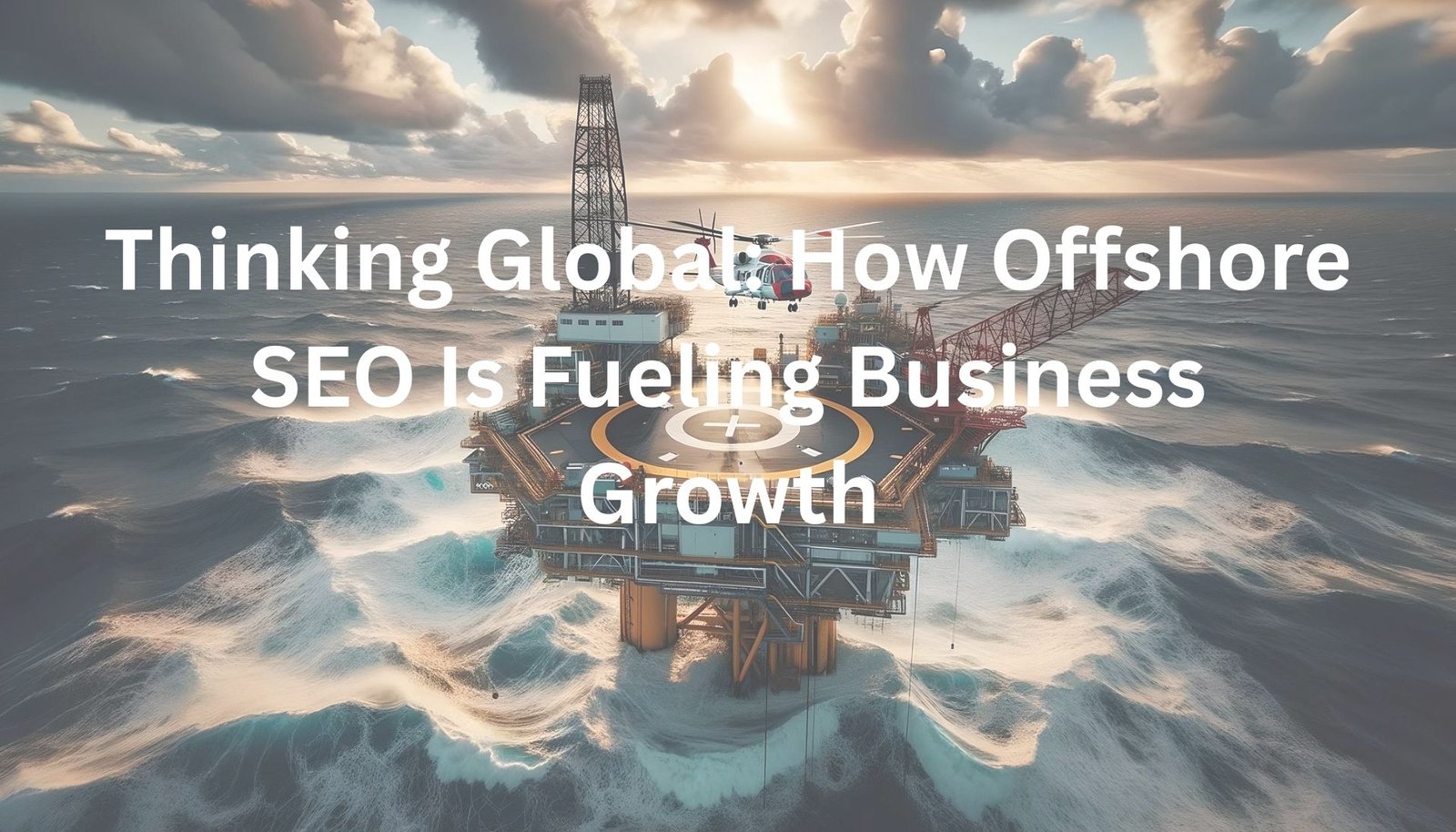
In today’s digital economy, borders mean less than they ever have—and search visibility means more.
Global businesses aren’t just competing with the shop down the street or the agency across town. They’re jostling for space on the same search engine results pages as multinational corporations, nimble startups, and hungry mid-sized players thousands of miles away. In that chaotic, algorithm-driven marketplace, how do businesses scale efficiently without bleeding marketing budgets dry?
One strategy is turning heads—and delivering results: offshore SEO.
For some, it’s still a buzzword. For others, it’s become a secret weapon. Offshore SEO isn’t about cutting corners or chasing cheap labor—it’s about accessing global expertise at a fraction of domestic costs. It’s about time-zone advantages, round-the-clock productivity, and working with international teams who bring niche skills, multilingual capabilities, and platform fluency that’s hard to find locally.
But offshore SEO is also misunderstood. It gets tossed in with generic outsourcing or mistaken for one-size-fits-all link-building mills. The truth is more nuanced, more strategic—and much more promising for businesses ready to think globally and rank competitively.
Let’s break it down.
What Is Offshore SEO?
Offshore SEO refers to the practice of outsourcing search engine optimization tasks to service providers located in different countries—typically where operational costs are lower, but technical capabilities are still top-tier. It involves partnering with global teams to handle everything from on-page optimization and content creation to link-building, keyword research, and technical audits.
But make no mistake—offshore doesn’t mean off-track. The best offshore SEO teams work as true partners, aligning with brand goals, market needs, and ever-evolving algorithm shifts. What sets offshore SEO apart isn’t just price—it’s precision, perspective, and scalability.
When done right, it becomes a growth engine. One that runs 24/7, draws on diverse talent, and helps businesses punch above their weight in global search rankings.
Offshore vs. Local SEO: Key Differences
The fundamental difference lies in geography—but the implications go much deeper.
- Local SEO is tailored to physical proximity. It’s highly contextual and focuses on optimizing visibility within a specific location or region—think Google Maps, “near me” searches, and local review platforms.
- Offshore SEO, in contrast, is operationally remote. But that doesn’t mean it’s disconnected. Offshore SEO providers can still serve local SEO needs—they just do it from another country, often with more agility and cost-efficiency.
Local SEO is about where you’re seen. Offshore SEO is about how you’re seen—globally, affordably, and at scale.
The real question businesses should ask isn’t “offshore or local?” —it’s “which model best matches my strategy, goals, and resources?”
Types of SEO Services
Offshore SEO has matured well beyond basic link-building or blog writing. Reputable providers now offer full-stack SEO solutions, including
- Technical SEO Audits: Identifying crawl errors, broken links, duplicate content, and performance issues.
- On-Page Optimization: Meta tags, header structures, schema markup, image alt texts, internal linking.
- Content Strategy and Creation: SEO-driven blog writing, landing page copy, multilingual content.
- Link Building and Outreach: Ethical, white-hat link acquisition with relevance and authority.
- Competitor & Keyword Analysis: Market-specific research tailored to different geographic or linguistic segments.
- Analytics and Reporting: Tools like GA4, Search Console, and SEMrush for transparent tracking and growth measurement.
These services are often bundled flexibly, allowing brands to scale up or down based on campaigns, budgets, or seasonal priorities.
Common Offshore SEO Destinations
Several countries have become global hubs for high-quality, cost-effective SEO services. Each has its own strengths:
- India: A dominant force in the offshore SEO landscape, with massive talent pools, English fluency, and competitive pricing. Known for technical SEO, scalable content operations, and data analysis.
- Philippines: Particularly strong in content creation and English-language customer support. Their SEO teams are highly collaborative and culturally aligned with Western markets.
- Eastern Europe: Renowned for technical expertise, UX understanding, and close time-zone overlap with Western Europe.
- Latin America: A growing destination for U.S.-facing businesses seeking bilingual SEO and digital teams within close proximity.
What these destinations share isn’t just affordability—it’s strategic alignment. Many of their agencies work hand-in-hand with global clients to deliver bespoke, algorithm-resilient strategies.
Why Businesses Choose Offshore SEO
For many growing companies, digital marketing feels like a balancing act between wanting results and staying on budget. Offshore SEO steps in as the middle ground—offering serious strategy without the sticker shock.
But cost isn’t the only reason businesses are crossing borders for their SEO. It’s also about flexibility, expertise, and speed.
1. Cost Efficiency Without Compromising Quality
Let’s get this out of the way: offshore SEO is not code for cheap and sloppy.
Yes, it’s more affordable. But the best offshore SEO firms today are offering top-tier service—often on par with (or exceeding) what you’d pay double or triple for locally. Why? Lower overheads, favorable currency exchange rates, and an agile operating model.
And here’s the kicker: many of these agencies are staffed by SEO professionals who’ve worked with global brands, studied international markets, and live and breathe white-hat strategy. You’re not sacrificing quality—you’re just skipping the bloat.
2. Access to a Global Talent Pool
When you go offshore, you’re not limited to local hiring networks. You’re tapping into an international bench of:
- Technical SEO specialists
- Multilingual content writers
- Link-building strategists with geo-specific networks
- Niche industry SEO experts
This global talent pool brings diverse perspectives, cultural fluency, and platform knowledge that helps your brand resonate in different markets. It’s not just about reach—it’s about relevance.
3. 24/7 Productivity
Different time zones might sound like a communication hurdle—until you realize the strategic upside.
With offshore teams working while you sleep, progress doesn’t pause. Deadlines are met faster, issues get addressed overnight, and your SEO engine keeps humming across time zones. It’s the closest thing to continuous optimization.
4. Faster Scaling of SEO Campaigns
Need to double your content output? Expand into a new market? Increase backlink velocity?
Offshore SEO makes scaling seamless. Teams are often built to be flexible—ready to ramp up or pivot quickly based on your evolving business goals. You don’t have to spend months hiring, onboarding, or retraining. You brief, they execute.
How Offshore SEO Supports Global Business Expansion
The internet doesn’t care where your headquarters are. But Google does care about how relevant, credible, and technically sound your website is—especially if you’re targeting multiple regions.
Offshore SEO helps position your brand beyond borders—without losing the local touch.
1. SEO for Entering New International Markets
Launching in a new country? You’ll need more than a translated homepage.
Offshore SEO partners often bring experience in internationalization strategy, including:
- Region-specific keyword research
- Competitor analysis in target markets
- Localized content with cultural nuance
- Geo-targeted landing pages and hreflang implementation
They help you build visibility in new markets before you even land there physically.
2. Building International Backlinks
One of the most underutilized assets of offshore SEO is access to international backlink networks.
These providers know which publishers, directories, forums, and guest post opportunities are actually authoritative in different geographies. The result? A healthier backlink profile with reach across regions—something most local SEO firms can’t deliver at scale.
3. Boosting Online Visibility Across Borders
Offshore SEO isn’t just about ranking on Google.com—it’s about ranking on Google.de, Google.in, Google.ca, and everywhere in between.
Whether it’s building content that speaks multiple languages, optimizing for mobile experiences in bandwidth-limited areas, or navigating regional compliance like GDPR—offshore teams bring the local insight and technical prowess needed to boost discoverability globally.
Key Benefits of Offshore SEO for Business Growth
Still wondering if offshore SEO is just another cost-cutting tactic? It’s not. When done right, it becomes a catalyst for smarter, leaner growth.
1. Higher ROI from Digital Marketing
Offshore SEO allows you to allocate your marketing budget more strategically. Instead of sinking your entire budget into high-priced retainers, you can:
- Fund content expansion
- Invest in conversion optimization
- Explore paid experimentation alongside organic
More strategy, less burn rate.
2. Improved SERP Rankings Globally
What good is a beautiful website if no one sees it?
Offshore SEO gives you access to experts who know how to move the needle—whether it’s via technical audits, keyword clustering, or earning authoritative backlinks. Many offshore teams track performance religiously, using enterprise-level tools to show you exactly where you’re winning (and where to push harder).
3. More Focus on Core Business Activities
Let’s be real—SEO is time-consuming. Algorithms change. Tools evolve. Link strategies get outdated.
When a reliable offshore team is managing your SEO, you get to focus on product, partnerships, and performance—without watching your website fall behind in the rankings.
How to Choose the Right Offshore SEO Partner
Here’s where it gets real. Offshore SEO works—but only if you pick the right partner.
This isn’t a place to gamble. It’s a place to vet ruthlessly, ask the right questions, and look past the shiny promises.
1. Evaluate Their Experience and Portfolio
Ask who they’ve worked with. Ask what industries they specialize in. Ask to see performance metrics, case studies, and sample audits.
Experienced offshore SEO firms often have cross-vertical expertise—ecommerce, SaaS, healthcare, law—and a track record of adapting strategies to fit different business models.
2. Ensure Transparency and Communication
Weekly check-ins. Shared dashboards. Clear KPIs. If they’re vague, dismissive, or slow to respond now—they’ll be worse when real campaigns start.
Great offshore teams act like extensions of your team. They’re proactive, not reactive. They explain their work. They report honestly. And they make sure you understand why something’s being done—not just what.
3. Look for Customizable Service Packages
Your needs aren’t static, and your SEO plan shouldn’t be either.
Look for partners who offer modular services—content-only, link-building-only, full-stack SEO—and the ability to scale efforts as your business grows. You want flexibility without fragmentation.
4. Check Reviews and References
Don’t just scroll their website. Check Clutch. Look up client testimonials on LinkedIn. Ask for references—and actually talk to them.
What you want to know: Are they consistent? Do they deliver on time? Do they stay up to date with Google updates? Did past clients really see growth?
Future of Offshore SEO in a Global Digital Economy
Offshore SEO isn’t a temporary fix. It’s part of a larger digital evolution—one where location matters less, and performance matters more. As businesses chase better rankings and deeper market penetration, offshore SEO is becoming more sophisticated, more strategic, and more aligned with the realities of a global, multilingual internet.
So where is it all heading?
I. Rise of AI and Automation in Offshore SEO
The integration of AI in offshore SEO isn’t just coming—it’s already reshaping workflows. Leading offshore teams are now deploying:
- AI-powered keyword research to uncover intent-based opportunities at scale
- Content optimization tools like Surfer, Clearscope, or MarketMuse to refine semantic relevance
- Automated audits that flag technical SEO issues in real time
- AI-assisted link prospecting and outreach personalization for faster, smarter link acquisition
But here’s the real differentiator: knowing when to use AI—and when to overrule it.
Human judgment still governs strategy. AI handles the heavy lifting. And the best offshore providers know how to combine the two for maximum search visibility.
II. Increasing Demand for Multilingual SEO
As companies push into Latin America, Southeast Asia, the Middle East, and Europe, multilingual SEO is no longer optional—it’s the edge.
Today’s offshore SEO teams are evolving into cross-cultural content strategists. They’re optimizing not just for translation, but for localization. That means:
- Researching search behavior in native languages
Understanding regional idioms and product preferences - Crafting culturally aligned CTAs and metadata
- Structuring hreflang tags correctly for international domains
In a global economy where English-only strategies fall short, multilingual SEO is the next battlefield—and offshore teams are ready for it.
III. Sustainability and Ethical SEO Practices
Ethical SEO isn’t a nice-to-have anymore. It’s a survival skill.
Offshore providers are being held to higher standards by clients demanding:
- White-hat link building, not spammy networks
- GDPR-compliant data practices
- Inclusive, accessibility-minded content
- Transparent reporting and communication
The offshore agencies that thrive in the future won’t just be the fastest or the cheapest—they’ll be the most trusted.
Conclusion
Offshore SEO has outgrown its old stereotypes. It’s not about “outsourcing for less.” It’s about partnering for more—more scale, more expertise, more efficiency, and more global impact.
What started as a cost-saving tactic has evolved into a strategic pillar for growth-ready companies. And in 2025’s hyper-competitive landscape, brands can no longer afford to look at SEO through a purely local lens.
Here’s the truth: the best search visibility doesn’t come from proximity. It comes from perspective. An offshore SEO company brings that perspective—along with technical firepower, round-the-clock productivity, and cross-border fluency.
And the companies embracing it? They’re not just ranking. They’re expanding.






